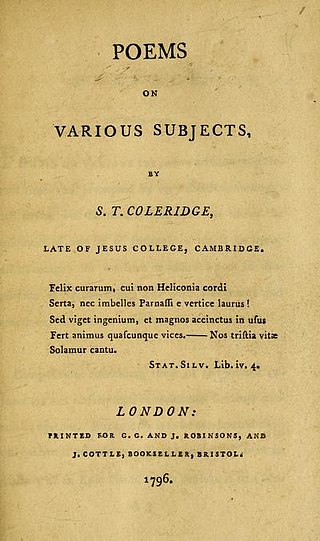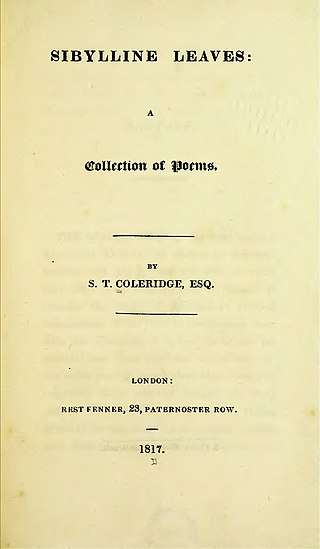Related Research Articles
This article contains information about the literary events and publications of 1798.
Nationality words link to articles with information on the nation's poetry or literature.
The Destruction of the Bastile was composed by Samuel Taylor Coleridge in 1789. The poem describes Coleridge's feelings of hopes for the French Revolution as a catalyst for political change.
On Receiving an Account that his only Sister's Death was Inevitable was composed by Samuel Taylor Coleridge in 1794, and deals with the death of Coleridge's step-sister Ann (1791), as well as that of his brother Luke (1790). A later poem, was written for Coleridge's friend Charles Lamb and seeks to comfort him after the loss of his sister.
Lines Written at Shurton Bars was composed by Samuel Taylor Coleridge in 1795. The poem incorporates a reflection on Coleridge's engagement and his understanding of marriage. It also compares nature to an ideal understanding of reality and discusses isolation from others.
Religious Musings was composed by Samuel Taylor Coleridge in 1794 and finished by 1796. It is one of his first poems of critical merit and contains many of his early feelings about religion and politics.
Ode on the Departing Year was composed by Samuel Taylor Coleridge in 1796. The poem describes Coleridge's feelings on politics and religion, and it emphasises an idyllic lifestyle as an optimal way of living.
The Destiny of Nations was composed by Samuel Taylor Coleridge as part of Robert Southey's Joan of Arc epic poem. The lines were later isolated from Southey's and expanded. The new poem includes Coleridge's feelings on politics, religion, and humanity's duty to helping each other.
"On Quitting School" is a sonnet written by Samuel Taylor Coleridge in 1791. It describes Coleridge's feelings of leaving school for Cambridge in an optimistic manner quite contrary to the views he expressed later in life.

The conversation poems are a group of at least eight poems composed by Samuel Taylor Coleridge (1772–1834) between 1795 and 1807. Each details a particular life experience which led to the poet's examination of nature and the role of poetry. They describe virtuous conduct and man's obligation to God, nature and society, and ask as if there is a place for simple appreciation of nature without having to actively dedicate one's life to altruism.
The Eolian Harp is a poem written by Samuel Taylor Coleridge in 1795 and published in his 1796 poetry collection. It is one of the early conversation poems and discusses Coleridge's anticipation of a marriage with Sara Fricker along with the pleasure of conjugal love. However, The Eolian Harp is not a love poem and instead focuses on man's relationship with nature. The central images of the poem is an Aeolian harp, an item that represents both order and wildness in nature. Along with the harp is a series of oppositional ideas that are reconciled with each other. The Eolian Harp also contains a discussion on "One Life", Coleridge's idea that humanity and nature are united along with his desire to try to find the divine within nature. The poem was well received for both its discussion of nature and its aesthetic qualities.
Reflections on Having Left a Place of Retirement is a poem written by English poet Samuel Taylor Coleridge in 1796. Like his earlier poem The Eolian Harp, it discusses Coleridge's understanding of nature and his married life, which was suffering from problems that developed after the previous poem. Overall, the poem focuses on humanity's relationship with nature in its various aspects, ranging from experiencing an Edenic state to having to abandon a unity with nature in order to fulfill a moral obligation to humanity. The discussion of man's obligation to each other leads into a discussion on the difference between the life of a philosopher and the life of a poet. By the end of the poem, the narrator follows the philosophical path in a manner similar to what Coleridge sought to do. The response to the poem from critics was mostly positive, with many of them emphasizing the religious aspects of the work in their analysis.
"This Lime-Tree Bower My Prison" is a poem written by Samuel Taylor Coleridge during 1797. The poem discusses a time in which Coleridge was forced to stay beneath a lime tree while his friends were able to enjoy the countryside. Within the poem, Coleridge is able to connect to his friend's experience and enjoy nature through him, making the lime tree only a physical prison, not a mental one.
Frost at Midnight is a poem by Samuel Taylor Coleridge, written in February 1798. Part of the conversation poems, the poem discusses Coleridge's childhood experience in a negative manner and emphasizes the need to be raised in the countryside. The poem expresses hope that Coleridge's son, Hartley, would be able to experience a childhood that his father could not and become a true "child of nature". The view of nature within the poem has a strong Christian element in that Coleridge believed that nature represents a physical presence of God's word and that the poem is steeped in Coleridge's understanding of Neoplatonism. Frost at Midnight has been well received by critics, and is seen as the best of the conversation poems.
Fears in Solitude, written in April 1798, is one of the conversation poems by Samuel Taylor Coleridge. The poem was composed while France threatened to invade Great Britain. Although Coleridge was opposed to the British government, the poem sides with the British people in a patriotic defense of their homeland. The poem also emphasizes a desire to protect one's family and to live a simple life in harmony with nature. The critical response to the poem was mixed, with some critics claiming that the work was "alarmist" and anti-British.
The Nightingale: A Conversation Poem is a poem written by Samuel Taylor Coleridge in April 1798. Originally included in the first edition of Lyrical Ballads, which he published with William Wordsworth, the poem disputes the traditional idea that nightingales are connected to the idea of melancholy. Instead, the nightingale represents to Coleridge the experience of nature. Midway through the poem, the narrator stops discussing the nightingale in order to describe a mysterious female and a gothic scene. After the narrator is returned to his original train of thought by the nightingale's song, he recalls a moment when he took his crying son out to see the Moon, which immediately filled the child with joy. Critics have found the poem either decent with little complaint or as one of his better poems containing beautiful lines.
"Dejection: An Ode" is a poem written by Samuel Taylor Coleridge in 1802 and was published the same year in The Morning Post, a London daily newspaper. The poem in its original form was written to Sara Hutchinson, a woman who was not his wife, and discusses his feelings of love for her. The various versions of the poem describe Coleridge's inability to write poetry and living in a state of paralysis, but published editions remove his personal feelings and mention of Hutchinson.
The Fall of Robespierre is a three-act play written by Robert Southey and Samuel Coleridge in 1794. It follows the events in France after the downfall of Maximilien Robespierre. Robespierre is portrayed as a tyrant, but Southey's contributions praise him as a destroyer of despotism. The play does not operate as an effective drama for the stage, but rather as a sort of dramatic poem with each act being a different scene. According to Coleridge, "my sole aim to imitate the impassioned and highly figurative language of the French Orators and develop the characters of the chief actors on a vast stage of horrors."

Poems on Various Subjects (1796) was the first collection by Samuel Taylor Coleridge, including also a few sonnets by Charles Lamb. A second edition in 1797 added many more poems by Lamb and by Charles Lloyd, and a third edition appeared in 1803 with Coleridge's works only. All three editions included poems in Coleridge's early Miltonic style, such as his Religious Musings and Monody on the Death of Chatterton, alongside lyrics and some of his first conversation poems, such as The Eolian Harp, in a style suggested by the works of William Cowper. The book was on the whole well received by reviewers; modern critics value it more for its shorter and lighter poems than for its formal set-pieces.

Sibylline Leaves: A Collection of Poems is a volume of poems by Samuel Taylor Coleridge, first published in 1817.
References
- Ashton, Rosemary. The Life of Samuel Taylor Coleridge. Oxford: Blackwell, 1997.
- Coleridge, Samuel Taylor (1921). Coleridge, Ernest Hartley (ed.). The Poems of Samuel Taylor Coleridge. Oxford University Press.
- Holmes, Richard. Coleridge. New York: Pantheon Books, 1989.
- Mays, J. C. C. (editor). The Collected Works of Samuel Taylor Coleridge: Poetical Works Vol I.I. Princeton: Princeton University Press, 2001.
